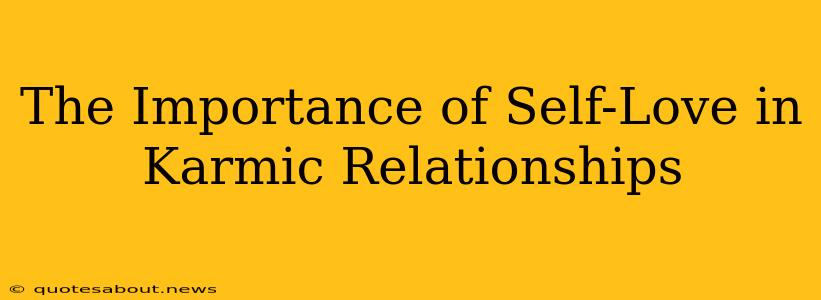Karmic relationships—intense, often tumultuous connections that feel deeply significant—can be transformative journeys. But navigating these powerful dynamics requires a strong foundation: self-love. Without it, we risk repeating unhealthy patterns and hindering our spiritual growth. This article explores the vital role self-love plays in understanding and successfully navigating karmic relationships.
What are Karmic Relationships?
Before diving into the importance of self-love, let's clarify what constitutes a karmic relationship. These aren't simply relationships that are challenging; they're connections characterized by intense energy, rapid progression, and often, a sense of destiny or predetermined fate. They can feel both incredibly fulfilling and incredibly painful, pushing us to confront deep-seated issues and unresolved trauma. These relationships serve as catalysts for growth, forcing us to examine our behaviors, beliefs, and patterns. The lessons learned often revolve around forgiveness, healing, and self-discovery. They're not necessarily romantic; karmic connections can be found in friendships and family relationships as well.
How Does Self-Love Impact Karmic Relationships?
Self-love isn't about narcissism or self-obsession; it's about cultivating a deep respect and appreciation for oneself. This includes understanding your strengths and weaknesses, setting healthy boundaries, and prioritizing your well-being. Within the context of karmic relationships, self-love acts as a protective shield and a guiding compass.
Here's how:
-
Setting Healthy Boundaries: Karmic relationships can be emotionally draining. Self-love empowers you to recognize when your needs are not being met and to establish boundaries that protect your emotional and mental health. This prevents you from becoming a victim of manipulative or unhealthy dynamics.
-
Avoiding Codependency: Many fall into codependent patterns in karmic relationships, sacrificing their own needs to please their partner. Self-love encourages independence and self-sufficiency, preventing you from losing yourself in the relationship.
-
Recognizing and Breaking Unhealthy Patterns: Karmic relationships often expose unresolved issues. Self-love allows you to identify these patterns—perhaps a tendency to attract unavailable partners or a fear of commitment—and actively work to break them.
-
Forgiveness and Self-Compassion: Karmic relationships often involve hurt and betrayal. Self-love is crucial in fostering self-compassion, allowing you to forgive yourself and others, and moving forward without resentment.
-
Attract Healthier Relationships: By working on your self-love, you increase your self-worth. This attracts healthier, more fulfilling relationships in the future, as you’re less likely to settle for less than you deserve.
Are Karmic Relationships Always Negative?
Not necessarily. While karmic relationships can be challenging, they also offer incredible opportunities for growth and self-discovery. They can push us to confront our deepest fears and insecurities, leading to profound personal transformation. The key lies in approaching them with self-awareness and a commitment to self-love.
How to Cultivate Self-Love in a Karmic Relationship (and Beyond)
Cultivating self-love is an ongoing journey, not a destination. Here are some practical steps:
-
Practice Self-Care: Prioritize activities that nourish your body, mind, and spirit. This might include exercise, meditation, spending time in nature, or engaging in hobbies you enjoy.
-
Set Boundaries: Learn to say "no" to things that drain your energy or compromise your values.
-
Practice Self-Compassion: Treat yourself with the same kindness and understanding you would offer a friend.
-
Affirmations: Use positive affirmations to reinforce your self-worth.
-
Seek Professional Help: A therapist can provide support and guidance in navigating complex emotional issues and unhealthy relationship patterns.
Can I Escape a Toxic Karmic Relationship?
Yes, absolutely. While karmic relationships can feel inescapable, remember that you always have the power to choose your actions and prioritize your well-being. If a karmic relationship is toxic and harmful, prioritize your safety and well-being and seek support from friends, family, or professionals to help you navigate leaving the relationship.
Conclusion
Karmic relationships, while often intense and challenging, offer valuable lessons about ourselves and our relationships. By prioritizing self-love, setting healthy boundaries, and cultivating self-compassion, you can navigate these powerful connections with grace and emerge stronger and more self-aware on the other side. Remember, self-love isn't selfish; it's essential for creating fulfilling and healthy relationships of all kinds.

